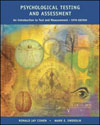 |  Psychological Testing and Assessment: An Introduction To Tests and Measurement, 5/e Ronald Jay Cohen
Mark Swerdlik
Tests of Intelligence
| Adaptive testing | An examination method or procedure characterized by individually tailoring presentation of items to the testtaker; also referred to as tailored testing, sequential testing, branched testing, and response-contingent testing, 262.
|  |  |  | | Anchor protocol | A test answer sheet developed by a test publisher to check the accuracy of examiners' scoring, 272
|  |  |  | | Basal level | A stage in a test achieved by a testtaker by meeting some preset criterion to continue to be tested, for example, responding correctly to two consecutive items on an ability test that contains increasingly difficult items may establish a "base" from which to continue testing; contrast with ceiling level, 262
|  |  |  | | Ceiling level | A stage in a test achieved by a testtaker as a result of meeting some preset criterion to discontinue testing; for example, responding incorrectly to two consecutive items on an ability test that contains increasingly difficult items may establish a presumed "ceiling" on the testtaker's ability; contrast with basal level and testing the limits, 262
|  |  |  | | Deviation IQ | A variety of standard score used to report "intelligence quotients" (IQs) with a mean set at 100 and a standard deviation set at 15. On the Stanford-Binet, it is also referred to as a test composite, and it represents an index of intelligence derived from a comparison between the performance of an individual testtaker and the performance of other testtakers of the same age in the test's standardization sample, 97, 259
|  |  |  | | Point scale | A test with items organized into subtests by category of item; contrast with age scale, 266-267
|  |  |  | | Ratio IQ | An index of intelligence derived from the ratio of the testtaker's mental age as calculated from a test, divided by his or her chronological age and multiplied by 100 to eliminate decimals, 258-259
|  |  |  | | Routing test | A subtest used to direct or route the testtaker to a suitable level of items, 262, 295
|  |  |  | | Short form | The abbreviated version of a test, typically created to reduce administration, scoring, and interpretation time, 277-278
|  |  |  | | Test composite | A test score or index derived from the combination and/or mathematical transformation of one or more test scores, 259
|  |  |  | | Testing the limits | (1) In ability testing, the continued administration of test items beyond the level at which the test manual dictates discontinuance; usually conducted only when the examiner has reason to believe an examinee can "pass" the higher-level items; (2) in the administration of the Rorschach test, an optional interview after the initial inquiry, in which the examiner asks questions designed to yield additional insights into the assessee's thought processes and personality, 263n, 369-370
|
|



 2002 McGraw-Hill Higher Education
2002 McGraw-Hill Higher Education